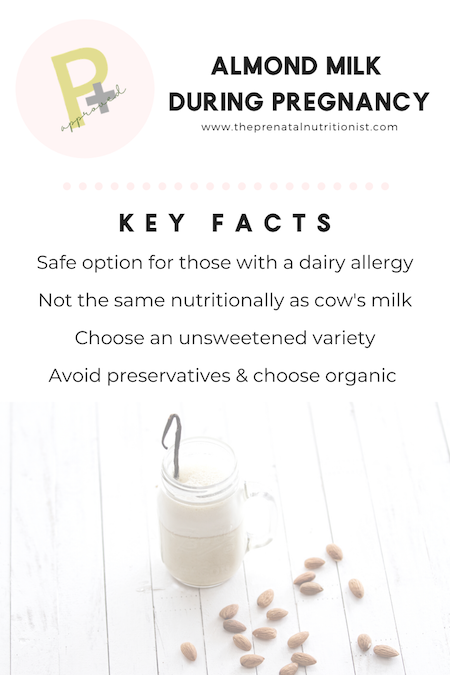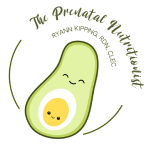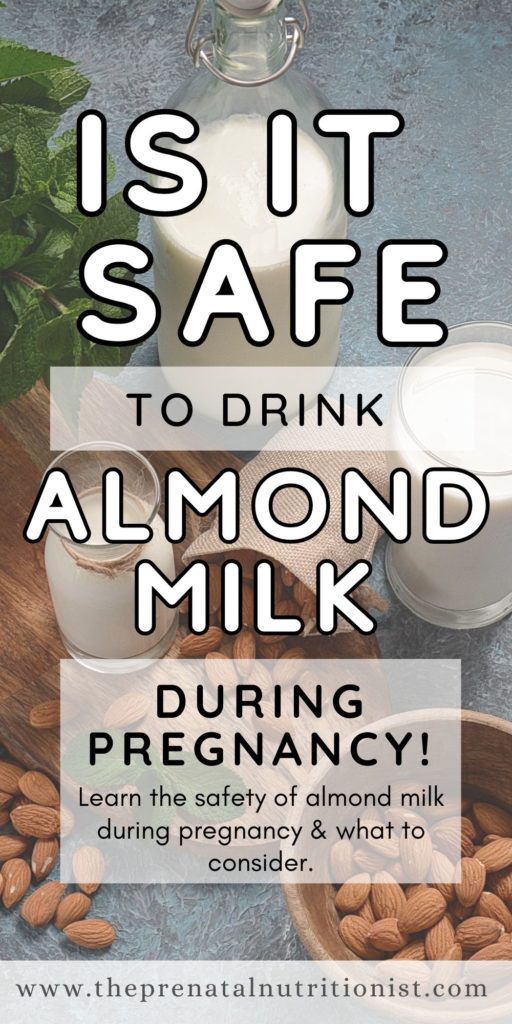
Almond Milk During Pregnancy
Milk is great for your pregnancy diet because it contains essential vitamins and minerals but what about non-dairy kinds of milk? Non-dairy “milks” are the latest health trend to hit all major grocery stores and your favorite coffee shops, but what about almond milk during pregnancy?
Is adding almond milk to your smoothie the best option for your body and your baby?
Many people switch from dairy milk and dairy products to almond milk because of dietary or allergy concerns, including lactose intolerance. Still, some who continue to drink dairy milk may want to add variety to their diet or enjoy it because of the taste or consistency. So how does almond milk compare to dairy milk for pregnancy?
Regardless of why you drink almond milk, we cover everything you need to know here to add it to your pregnancy diet.
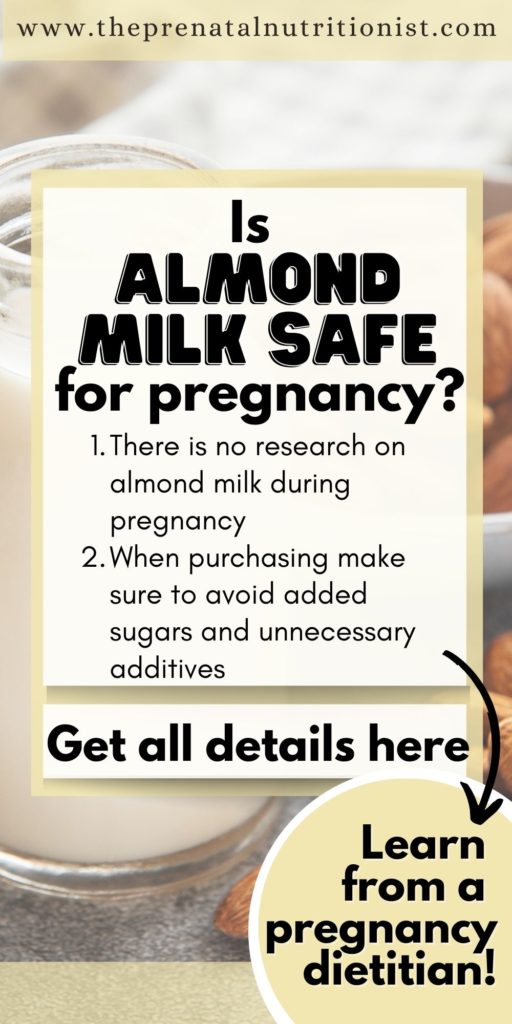
Is almond milk safe during pregnancy?
There is no research on almond milk during pregnancy as it is still a relatively new product on the market.
Almonds themselves are safe and quite a nutritious option for pregnancy due to their healthy fats, vitamin E and fiber content, but what happens when we turn them into liquid? Do we lose the nutritional value and miss out on key vitamins and minerals?
To make almond milk at home, you simply need almonds and water which lends to believe it is safe during pregnancy. However, not all almond milks are created equal.
For consistency, added flavor, and extended shelf-life, many beverage companies put various preservatives or food additives in their almond milk. Some of these are completely harmless, but others have shown potentially negative effects to get a long shelf life.
One food additive, carrageenan, is used to thicken, emulsify, and extend the shelf-life of certain products. It is often found in vegan or vegetarian products since it is derived from plants.
Studies have found a possible link to increased inflammation and gastrointestinal issues with excessive carrageenan consumption. So, the National Organic Standards Board removed it from the list of approved ingredients (1, 2).
There may also be other “gums” used for the same reasons as carrageenan but provide no nutritional value.
At the end of this article, we will discuss what to look for when purchasing almond milk at the store.
Is almond milk good for pregnancy?
As previously stated, there is no research on drinking almond milk during pregnancy, and you may want to be cautious if you have a nut allergy. However, it is generally considered safe to drink almond milk during pregnancy due to the nature of the product. Side effects of drinking almond milk during pregnancy are unknown.
While almond milk can certainly fit into a healthy prenatal diet, it is important to note cow’s milk and almond milk are nutritionally not the same. Most non-dairy milk does not share the same nutritional properties as cow’s milk (3).
Some almond milk is fortified with essential nutrients such as vitamin D, vitamin B12, and calcium, making it a good choice for those allergic or sensitive to cow’s milk and looking for a source of vitamins and minerals.
Fortified or not, almond milk is not a source of protein, iodine, or selenium, so ensure you are getting plenty of these three nutrients elsewhere.
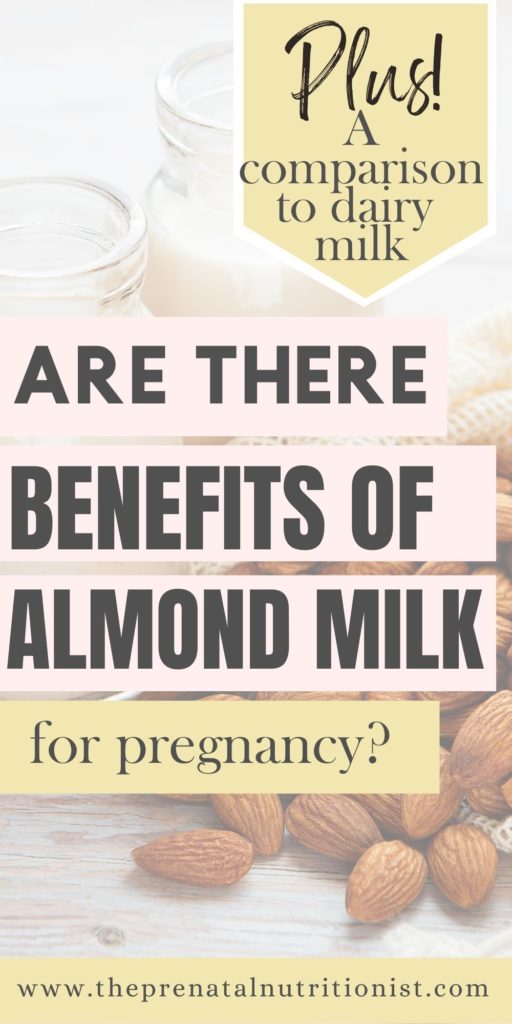
Benefits Of Almond Milk During Pregnancy
There are some benefits of almond milk during pregnancy. Almond milk contains fewer calories, less sugar (if unsweetened), less protein, and fewer nutrients than cow’s milk. Vitamin E can help reduce oxidative stress, and almond milk provides a decent amount of this antioxidant.
Consuming almond milk is low in calories. Although “lower calorie” food can quickly become appealing, but pregnancy is generally not a time when we want to “count calories” or intentionally choose “low-calorie” foods.
And although cow’s milk does technically contain more sugar and, therefore, more carbohydrates, this is naturally occurring.
Overall, almond milk can fit into a healthy prenatal diet, and an unsweetened almond milk, potentially fortified option could be perfect for those with a dairy allergy or sensitivity. You may want to consult with your healthcare provider if you have or are trying to manage gestational diabetes or high blood pressure.
Almond milk vs. cow’s milk nutrient breakdown
Replacing all your dairy milk with almond milk is not a direct swap, as you can see, but almond milk has benefits while pregnant.
Below are the nutritional values of dairy and almond milk for an 8 oz. or 1 cup serving.
Almond milk, unsweetened, unfortified (4)
Calories: 37
Fat: 3 g
Protein: 1 g
Carbs: 1 g
Fiber: < 1 g
Sugar: < 1 g
Calcium: 481 mg
Vitamin D: 0 g
Vitamin B12: 0 g
Potassium: 163 mg
Choline: 0 mg
Whole cow’s milk (5)
Calories: 149
Fat: 8 g
Protein: 8 g
Carbs: 12 g
Fiber: 0 g
Sugar: 12 g
Calcium: 276 mg
Vitamin D: 127 IU
Vitamin B12: 1.1 mcg
Potassium: 322 mg
Choline: 35 mg
You can see from this comparison that dairy from cows naturally provides many nutrients important for pregnancy, such as protein, calcium, iodine, vitamin B12, probiotics, and more, so if you aren’t allergic, it is beneficial for you and the baby during pregnancy.
What about other non-dairy milks during pregnancy?
Soy milk is a popular non-dairy beverage that has been around for ages, but more recently, we have seen practically everything liquified.
Other non-dairy “milk” include:
Oat milk
Cashew milk
Rice milk
Coconut milk
Pea milk
Hemp seed milk
Flaxseed milk
All of the above are safe to consume during pregnancy, but again contain a wide variety of nutrients likely not equivalent to cow’s milk. Like anything else, moderation is key for a healthy pregnancy.
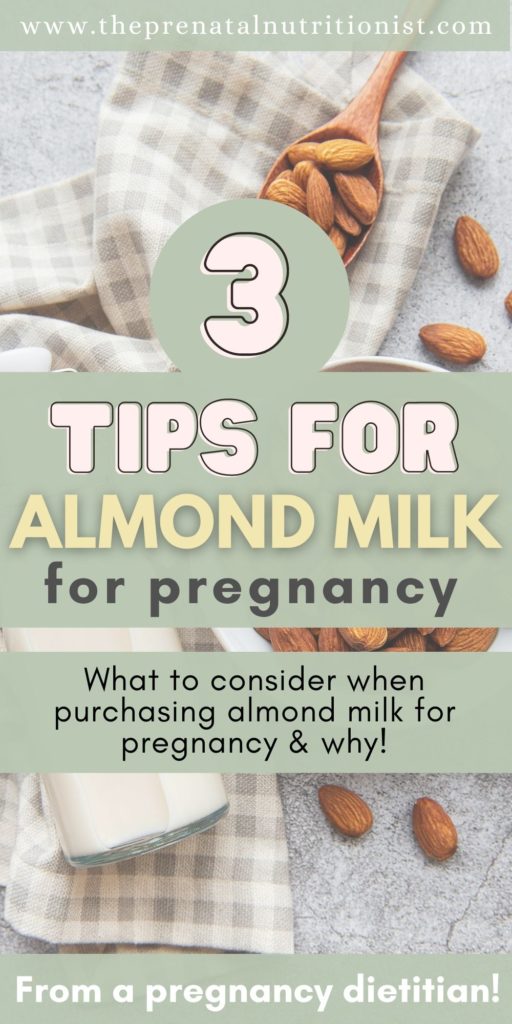
Tips for purchasing almond milk
As stated above, all kinds of milk are not created equal, nor are all kinds of almond milk. Below are some things to consider when reviewing almond milk options during your next grocery trip.
Choose unsweetened varieties to limit added sugar intake
Choose an organic option, if you can
Find one with two simple ingredients: almonds and water
Or, pick one without carrageenan
If you’re worried about nutrient intake, choose one that’s fortified
Alternatively, you can always make your own almond milk!
Several recipes are floating around the internet, touting it’s easy and have delicious flavor.
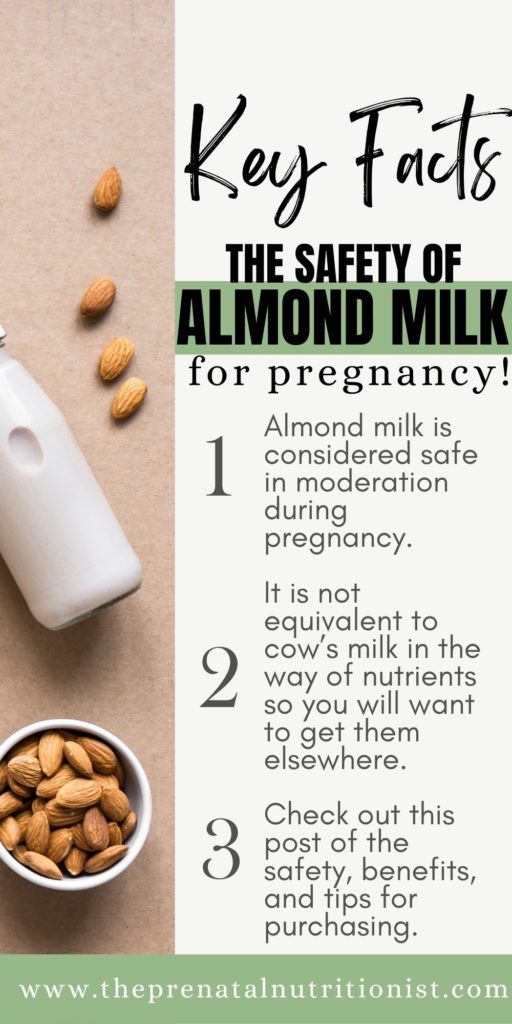
The Bottom Line
There is currently no research on almond milk while pregnant, but due to the nature of the product it is safe to consume in moderation.
Since almond milk is not equivalent to cow’s milk in the way of nutrients, it is important that you make sure you are getting these nutrients elsewhere in your diet.
When purchasing almond milk during pregnancy, make sure to avoid added sugars and unnecessary additives such as carrageenan. Look for an unsweetened almond milk when purchasing.
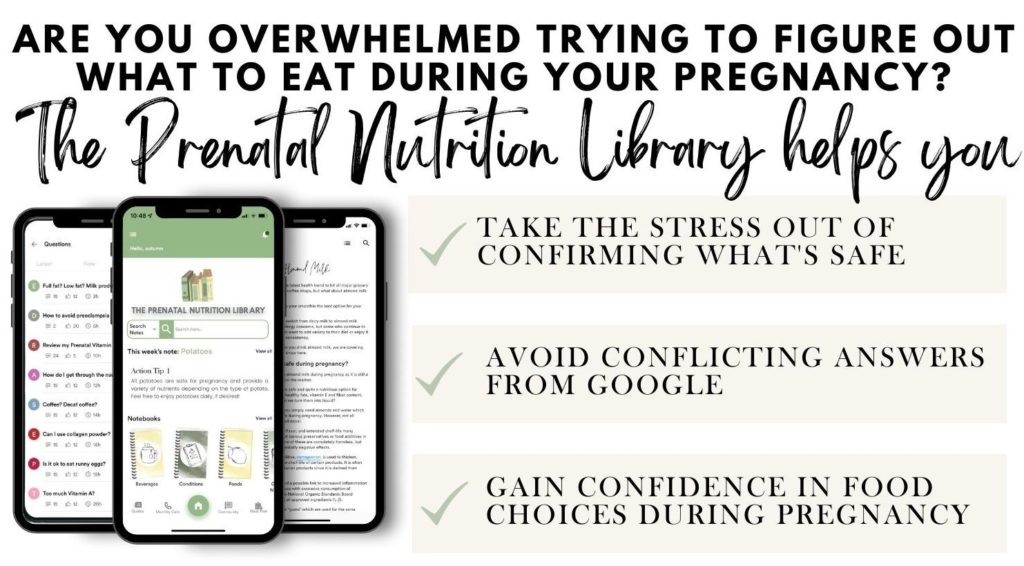

By Lauren Gannon, Dietetic Intern and Ryann Kipping, RDN, CLEC | Owner & Founder
